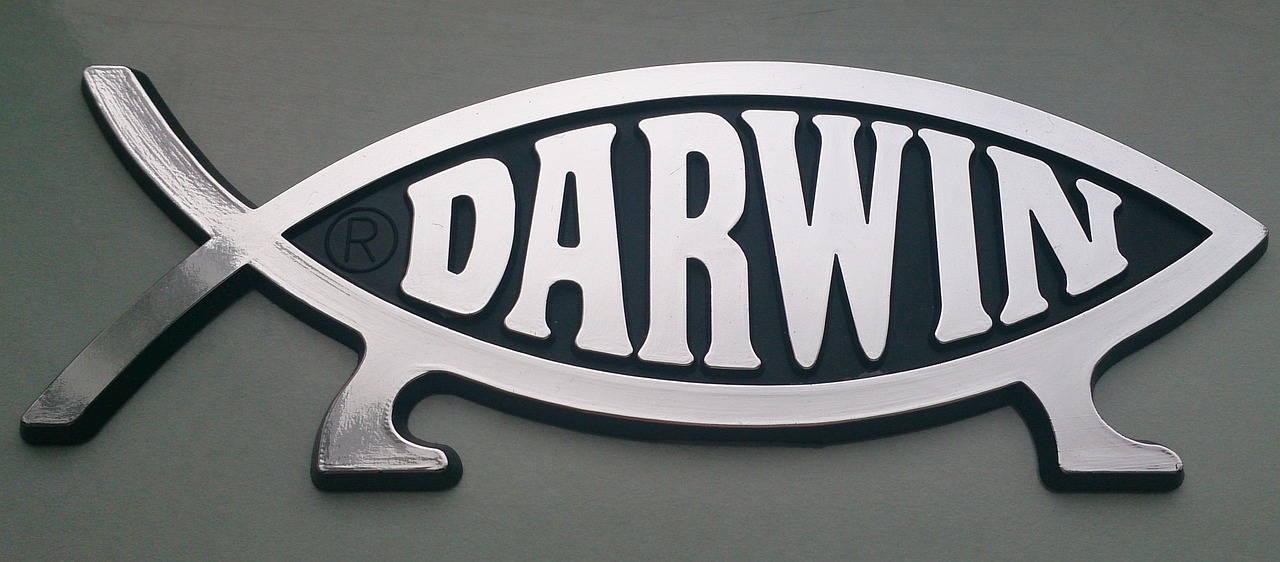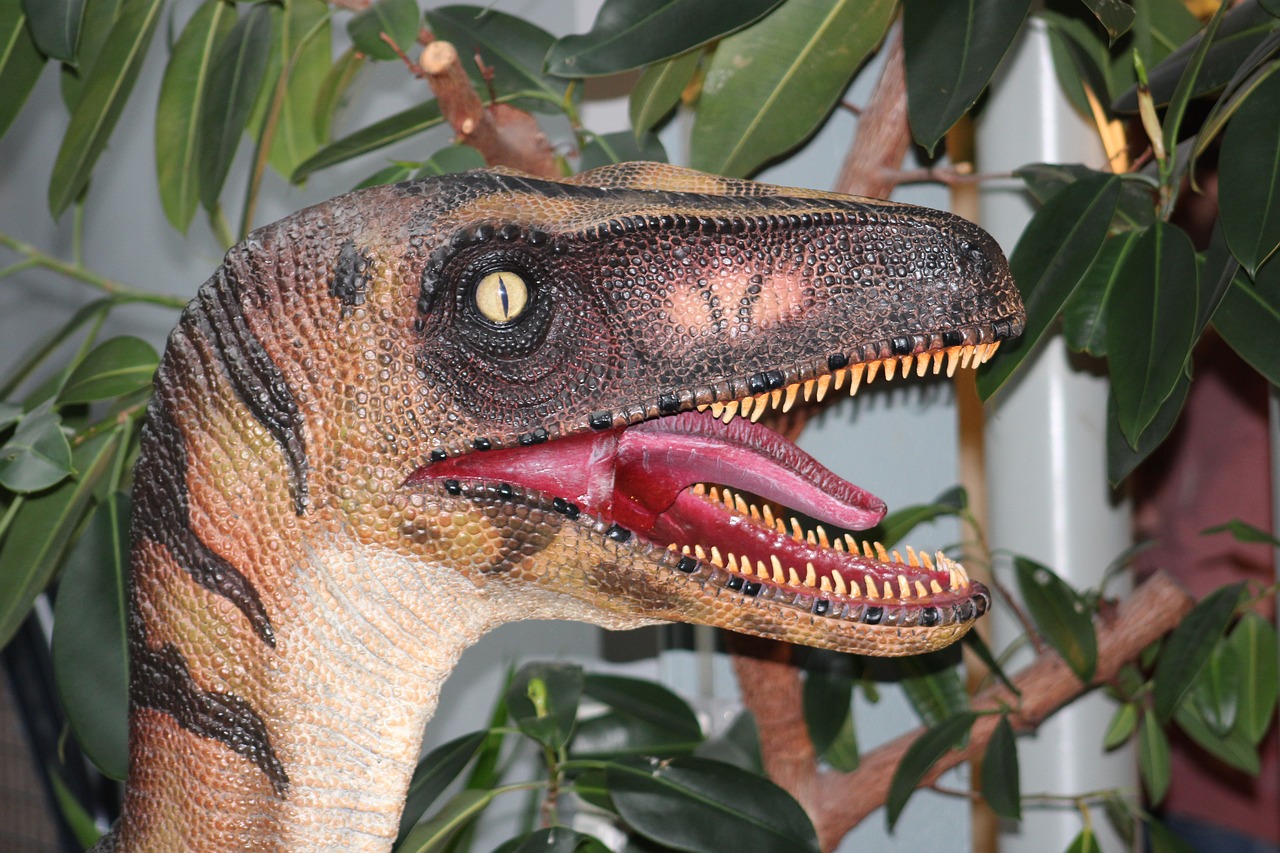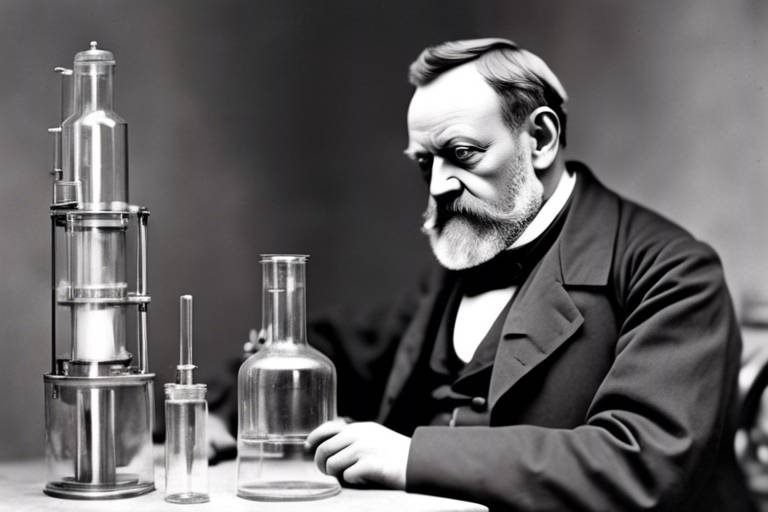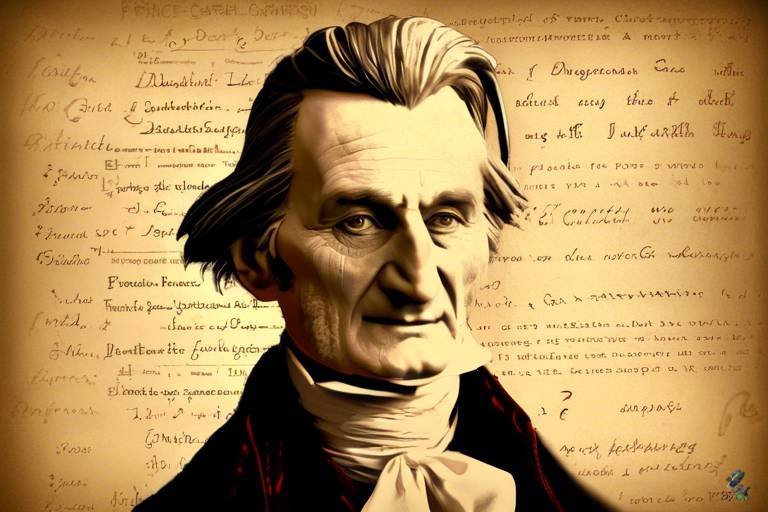Darwin: The Father of Evolution
Charles Darwin, often hailed as the father of evolution, was a remarkable naturalist whose groundbreaking work revolutionized the field of biology. His theory of evolution by natural selection has had a profound impact on our understanding of the origin of species and the diversity of life on Earth.
Darwin's early life and influences played a crucial role in shaping his curiosity and passion for the natural world. Growing up in a family with a strong interest in science, he developed a keen observation skills and a thirst for knowledge that would later define his scientific career.
One of the pivotal moments in Darwin's life was his voyage aboard the HMS Beagle, a journey that took him to various regions around the world. During this expedition, Darwin collected a wealth of data and observations that would form the basis of his theory of evolution.
His seminal work, On the Origin of Species, published in 1859, presented his theory of natural selection to the world. This groundbreaking publication challenged prevailing beliefs about the fixity of species and sparked intense debates within the scientific community and society at large.
Natural selection, a central concept in Darwin's theory, explains how species adapt to their environments over time through the process of survival of the fittest. This mechanism has been fundamental in understanding the diversity of life and the gradual change of species through generations.
Various lines of evidence, from fossil records to comparative anatomy, have provided strong support for Darwin's theory of evolution. These pieces of evidence have helped solidify the scientific consensus on the gradual development of species over millions of years.
Despite facing controversies and opposition during his time, Darwin's legacy in the field of biology has endured through the ages. His contributions have laid the foundation for modern evolutionary biology and continue to influence scientific research and thought today.
Modern evolutionary biology has expanded upon Darwin's ideas, incorporating new discoveries in genetics, ecology, and other fields. The study of evolution has led to a deeper understanding of the mechanisms driving biodiversity and the interconnectedness of all living organisms.
The impact of Darwin's work extends beyond the realm of science, influencing debates in religion, ethics, and our perception of the natural world. His ideas have challenged traditional beliefs and shaped our understanding of the interconnectedness of all life forms on Earth.

Early Life and Influences
Charles Darwin, born on February 12, 1809, in Shrewsbury, England, was destined for greatness from an early age. His father, Robert Darwin, a successful physician, and financier, provided young Charles with a comfortable upbringing that allowed him to pursue his interests in nature and science. Darwin's mother, Susannah Darwin, instilled in him a love for plants and gardens, fostering his early fascination with the natural world.
During his formative years, Darwin attended the University of Edinburgh to study medicine, following in his father's footsteps. However, he soon realized that his true passion lay in natural history and geology. This realization led him to transfer to Christ's College, Cambridge, where he was mentored by influential professors such as John Stevens Henslow and Adam Sedgwick, who further fueled his curiosity and passion for the sciences.
One of the pivotal moments in Darwin's life was his participation in the five-year voyage aboard the HMS Beagle as a naturalist. This journey, which began in 1831, took Darwin to exotic locations such as South America, the Galápagos Islands, and Australia. The diverse ecosystems and unique species he encountered during the voyage laid the groundwork for his later theories on evolution and natural selection.
Throughout his life, Darwin was greatly influenced by the works of eminent scientists and thinkers of his time, including geologist Charles Lyell, whose principles of geological change over long periods of time resonated with Darwin's observations of gradual species transformation. Additionally, the writings of economist Thomas Malthus on population growth and competition for resources provided Darwin with a crucial insight into the struggle for existence that underpins his theory of natural selection.
In conclusion, Darwin's early life and influences played a significant role in shaping his scientific journey and laying the foundation for his groundbreaking theory of evolution. From his upbringing in a nurturing environment that nurtured his curiosity to the transformative voyage on the HMS Beagle and the intellectual influences that shaped his thinking, Darwin's formative years set the stage for his revolutionary contributions to the field of biology.

Voyage on the HMS Beagle
Charles Darwin's voyage on the HMS Beagle was a pivotal moment in his life, setting the stage for his groundbreaking work in evolutionary theory. Embarking on this expedition in 1831, Darwin served as the ship's naturalist, tasked with collecting specimens and making observations of the diverse flora and fauna encountered during the journey.
During the five-year voyage, the HMS Beagle circumnavigated the globe, visiting various continents and islands. Darwin meticulously documented his findings, noting the unique characteristics of different species and the variations among populations in different environments.
One of the most significant stops on the voyage was the Galápagos Islands, where Darwin made key observations that would later inspire his theory of evolution. The distinct species he encountered on the islands, each adapted to its specific environment, provided crucial evidence for the concept of natural selection.
Through his experiences on the HMS Beagle, Darwin gained firsthand insight into the diversity of life on Earth and the interconnectedness of species across different regions. His observations laid the foundation for his revolutionary ideas on the origin of species and the mechanisms driving evolutionary change.

The Origin of Species
Charles Darwin's seminal work, On the Origin of Species, published in 1859, stands as a cornerstone in the history of science. In this revolutionary book, Darwin presented his theory of evolution through natural selection, challenging the prevailing beliefs of his time and forever altering our understanding of the natural world.
Darwin's central argument in On the Origin of Species revolves around the concept of natural selection as the driving force behind the diversity of life on Earth. He proposed that organisms best adapted to their environments are more likely to survive and reproduce, passing on advantageous traits to their offspring. Over time, this process leads to the gradual evolution of species, as individuals with favorable variations thrive and those without struggle to survive.
One of the key insights Darwin offered in his book was the idea that all species, including humans, share a common ancestry. By observing patterns of variation and adaptation in different populations, Darwin argued for the interconnectedness of life forms and the continuous process of change that shapes the living world.
Through meticulous observations of plants, animals, and fossils, Darwin provided compelling evidence to support his theory of evolution. He highlighted the role of geological processes, such as the formation of sedimentary layers and the discovery of ancient fossils, in elucidating the history of life on Earth and the gradual transformation of species over millions of years.
On the Origin of Species sparked intense debates and controversies within the scientific community and society at large. Darwin's ideas challenged deeply held religious beliefs about the origins of life and the uniqueness of human beings, leading to heated discussions about the compatibility of evolution with religious doctrine.
Despite facing criticism and skepticism, Darwin's work laid the foundation for modern evolutionary biology and our understanding of the mechanisms driving species diversity. His emphasis on the importance of evidence-based reasoning and empirical observation continues to shape scientific inquiry and discovery to this day.
In conclusion, On the Origin of Species remains a seminal text that not only transformed the field of biology but also had a profound impact on our worldview. Darwin's insights into the processes of variation, adaptation, and natural selection have enduring relevance in the study of life's diversity and the interconnectedness of all living organisms.

On the Origin of Species,
Explore the life and work of Charles Darwin, the renowned naturalist whose theory of evolution revolutionized the field of biology and our understanding of the origin of species.
Discover Darwin's upbringing, education, and the key influences that shaped his curiosity and passion for the natural world.
Follow Darwin's transformative journey aboard the HMS Beagle, where he collected crucial data and observations that would later inform his theory of evolution.
Learn about Darwin's groundbreaking publication, On the Origin of Species, and the profound impact it had on scientific thought and society.
Understand the concept of natural selection, a cornerstone of Darwin's theory, and how it explains the mechanism behind species adaptation and evolution.
Explore the various lines of evidence, from fossil records to comparative anatomy, that support Darwin's theory of evolution and the gradual change of species over time.
Examine the controversies surrounding Darwin's theory of evolution during his time and the enduring legacy he left in the field of biology and beyond.
Delve into how Darwin's ideas have evolved and expanded in modern evolutionary biology, shaping our understanding of genetics, ecology, and the diversity of life on Earth.
Reflect on the far-reaching impact of Darwin's work on science, religion, ethics, and our perception of the natural world, highlighting the ongoing relevance of evolutionary theory today.
Charles Darwin's seminal work, On the Origin of Species, published in 1859, presented his theory of evolution by natural selection. In this groundbreaking book, Darwin detailed how species evolve over time through the process of natural selection, where organisms best adapted to their environment are more likely to survive and reproduce, passing on their advantageous traits to future generations. This work laid the foundation for modern evolutionary biology and forever changed our understanding of the diversity of life on Earth.

and the profound impact it had on scientific thought and society.
Charles Darwin's publication, On the Origin of Species, had a profound impact on both scientific thought and society. This groundbreaking work challenged prevailing beliefs about the creation of species and introduced the concept of evolution through natural selection. Darwin's theory sparked intense debates among scientists, religious leaders, and the general public, as it called into question long-held beliefs about the origins of life on Earth.
Scientifically, Darwin's theory of evolution revolutionized the field of biology by providing a unifying explanation for the diversity of life forms on our planet. It offered a compelling framework for understanding how species adapt and change over time, laying the foundation for modern evolutionary biology. Darwin's emphasis on the importance of evidence and observation in supporting his ideas set a new standard for scientific inquiry and reasoning.
Moreover, the impact of Darwin's work extended beyond the realm of science. His theory of evolution challenged traditional religious beliefs about the creation of life, leading to heated debates over the compatibility of evolution with religious teachings. The social implications of Darwin's theory were also significant, as it raised questions about human origins, morality, and the interconnectedness of all living beings.
In society, Darwin's ideas sparked a broader conversation about the nature of humanity and our place in the natural world. They prompted a reevaluation of human relationships with other species and the environment, highlighting the interconnectedness of all living organisms. Darwin's emphasis on adaptation and survival resonated with broader societal discussions about progress, competition, and the interconnectedness of all living beings.
Overall, Darwin's work not only transformed our understanding of the natural world but also had a lasting impact on scientific thought, religious beliefs, and societal values. His legacy continues to shape discussions in fields ranging from biology to philosophy, emphasizing the enduring relevance of evolutionary theory in today's world.

Natural Selection
Natural selection is the fundamental mechanism proposed by Charles Darwin to explain how species evolve over time. Imagine a vast buffet where different organisms are competing for the most desirable dishes. In this scenario, those with the most effective strategies for obtaining food survive and thrive, passing on their advantageous traits to their offspring. It's like a never-ending game of survival where only the fittest players get to advance to the next level.
Through natural selection, species gradually adapt to their environment, developing characteristics that enhance their chances of survival and reproduction. It's like a continuous refining process where only the traits that provide a competitive edge endure, while less beneficial traits fade away like obsolete technologies in the face of innovation.
Picture a diverse ecosystem where each species is like a piece in a giant puzzle, perfectly shaped to fit its specific niche. Natural selection acts as the sculptor, shaping and molding these pieces over generations to ensure they harmoniously coexist and contribute to the overall balance of nature.
Furthermore, natural selection is not a force of conscious design but rather a result of the relentless pressure exerted by the environment on living organisms. It's like a silent but powerful hand that guides the course of evolution, steering it towards greater complexity and adaptability.

Evidence for Evolution
When examining the , one of the key pillars supporting Darwin's theory is the fossil record. Fossils provide a glimpse into the past, showcasing the gradual changes in species over millions of years. By studying these ancient remains, scientists can trace the evolutionary history of various organisms and observe the transitions between different forms of life.
Another compelling line of evidence for evolution lies in comparative anatomy. By analyzing the anatomical structures of different species, researchers can identify similarities and differences that point to a common ancestry. For instance, the presence of homologous structures, such as the pentadactyl limb shared by mammals, reptiles, and birds, indicates a shared evolutionary history.
Furthermore, biogeography offers valuable insights into the distribution of species around the globe and how they have evolved in response to their environments. The patterns of species distribution on different continents and islands align with the concept of evolution, highlighting how organisms have adapted to diverse habitats over time.
In addition to these traditional lines of evidence, modern molecular biology has provided compelling support for evolutionary theory. By examining the genetic material of organisms, scientists can trace genetic similarities and differences, revealing evolutionary relationships between species. The study of DNA sequences has revolutionized our understanding of evolutionary history and the mechanisms driving genetic changes over generations.

Controversies and Legacy
Charles Darwin's theory of evolution by natural selection sparked intense controversies during his time, challenging deeply held beliefs about the origins of life and the diversity of species. Religious institutions and traditional scientific views clashed with Darwin's revolutionary ideas, leading to heated debates and opposition. The concept of humans evolving from apes, as proposed by Darwin, particularly stirred controversy and disbelief among the public and the scientific community.
Despite facing backlash and skepticism, Darwin's legacy in the field of biology is undeniable. His work laid the foundation for modern evolutionary theory and revolutionized our understanding of the natural world. Darwin's emphasis on the interconnectedness of all living beings and the gradual process of species adaptation continues to shape scientific inquiry and biological research to this day.
Moreover, Darwin's legacy extends beyond the realm of science, influencing philosophical, ethical, and societal discourse. The implications of evolutionary theory on human ethics, morality, and the concept of a universal ancestor have sparked ongoing discussions and reflections on our place in the natural world. Darwin's ideas have transcended scientific boundaries, leaving a lasting impact on diverse fields and challenging conventional thinking.

Modern Evolutionary Biology
Modern evolutionary biology has built upon the foundation laid by Charles Darwin, expanding our understanding of the intricate mechanisms driving the diversity of life on Earth. Through advancements in genetics, ecology, and molecular biology, scientists have delved deeper into the complexities of evolution, uncovering new insights into how species adapt and evolve over time.
One of the key advancements in modern evolutionary biology is the integration of genetics into the study of evolution. By unraveling the genetic code of organisms, researchers can trace evolutionary relationships, uncover genetic mutations that drive adaptation, and explore the mechanisms of inheritance that underpin evolutionary change.
Ecology also plays a crucial role in modern evolutionary biology, as scientists study how organisms interact with their environment and how these interactions drive evolutionary processes. From the impact of climate change on species distribution to the coevolution of predators and prey, ecology provides a holistic perspective on the dynamics of evolution.
Furthermore, the study of molecular biology has revolutionized our understanding of evolution at the molecular level. By examining the molecular mechanisms that govern gene expression, protein synthesis, and genetic variation, researchers can uncover the molecular basis of evolutionary change and the underlying processes that shape the diversity of life.
Moreover, modern evolutionary biology has expanded beyond the traditional focus on species-level evolution to explore phenomena such as epigenetics, symbiosis, and speciation. These emerging fields offer new avenues for understanding the complexities of evolution and the interconnectedness of life forms on our planet.
In summary, modern evolutionary biology continues to push the boundaries of our knowledge, revealing the intricate tapestry of life's evolution and the dynamic interplay of genetic, ecological, and molecular factors that drive the diversity of living organisms.

Impact on Science and Society
Charles Darwin's impact on science and society cannot be overstated. His theory of evolution by natural selection revolutionized the field of biology and had profound implications for our understanding of the natural world. Darwin's work challenged long-held beliefs about the origins of species and sparked intense debates that continue to this day.
One of the key impacts of Darwin's theory was its influence on the scientific community. By providing a mechanism for how species change and adapt over time, Darwin laid the foundation for modern evolutionary biology. His ideas have shaped our understanding of genetics, ecology, and the interconnectedness of all living organisms on Earth.
Furthermore, Darwin's theory had significant implications for society at large. It challenged traditional religious beliefs about the creation of life and the role of humans in the natural world. The concept of evolution by natural selection raised questions about the relationship between science and faith, sparking debates that continue to shape discussions on topics such as education and public policy.
Moreover, Darwin's work had a lasting impact on ethical considerations in science and society. The idea that all living organisms are connected through a shared evolutionary history has led to a greater appreciation for the diversity of life on Earth and the importance of conservation and biodiversity. Darwin's theory continues to inform discussions on environmental policy and the preservation of endangered species.
In conclusion, Charles Darwin's legacy extends far beyond the realm of biology. His ideas have had a lasting impact on science, society, and our understanding of the natural world. By challenging prevailing beliefs and providing a new framework for understanding the diversity of life on Earth, Darwin's theory of evolution continues to shape our worldview and inspire ongoing research and exploration.
Frequently Asked Questions
- 1. What is Charles Darwin known for?
Charles Darwin is renowned for his theory of evolution, which revolutionized the field of biology and our understanding of the origin of species. His work laid the foundation for modern evolutionary biology.
- 2. How did Darwin's voyage on the HMS Beagle influence his theory of evolution?
Darwin's journey on the HMS Beagle provided him with the opportunity to collect crucial data and observations that would later inform his theory of evolution. The diverse ecosystems he encountered during the voyage played a significant role in shaping his ideas.
- 3. What is natural selection?
Natural selection is a key concept in Darwin's theory of evolution. It describes the process by which organisms that are better adapted to their environment are more likely to survive and reproduce, passing on their advantageous traits to future generations.
- 4. What evidence supports the theory of evolution?
There are various lines of evidence that support the theory of evolution, including fossil records, comparative anatomy, molecular biology, and observations of natural selection in action. These pieces of evidence collectively provide a strong foundation for Darwin's ideas.
- 5. How has Darwin's work impacted science and society?
Darwin's work has had a profound impact on science, shaping fields such as genetics, ecology, and paleontology. Additionally, his theory of evolution has sparked debates on topics ranging from ethics to religion, highlighting its enduring relevance in contemporary society.



















